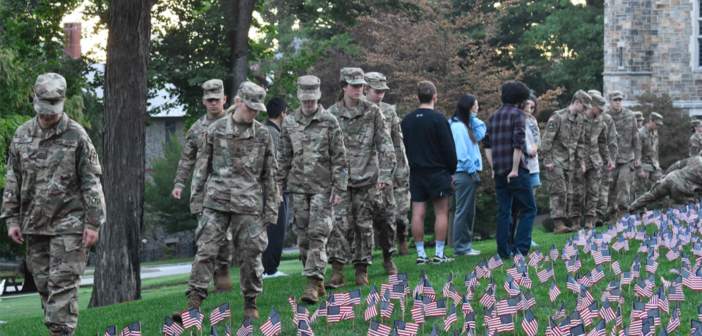Lehigh University Police chief Jason Schiffer was a police officer for the City of Bethlehem and on the emergency response team Sept. 11, 2001. He was on his way to a training when he first heard about the attacks.
“There was a feeling of hopelessness at the time,” Schiffer said.
Along with fellow Bethlehem police officers, Schiffer spent the day watching the news unfold in the squad room, wanting to do something. Throughout the day there was a heightened sense of what could happen next.
This year marks the 20th anniversary of the terrorist attacks in New York and Washington D.C.
Lehigh community members remember Sept. 11, 2001 very clearly.
Psychology Professor Almut Hupbach described the day as a “flashbulb memory,” one that may not be personally traumatic but significantly affected society, leading her to remember specific details like where she was and what she was wearing.
Hupbach said traumatic memories can either be vivid, or they can be fragmented and haunt you later on.
“Stress responses can overwhelm your memory system such that you don’t store the memories, you just store vivid snapshots, but not an entire story,” Hupbach said. “These can haunt you later on with post-traumatic stress, where you feel that you uncontrollably recall these things and become overwhelmed by emotion.”
Hupach said when people store a traumatic memory, the whole emotional system becomes involved.
Jeremy Littau, assistant professor of journalism, was working at The Daily News in Los Angeles at the time of the attacks.
“My main memory of that day is just being in the newsroom, actually, because I was asleep when it happened, and I think most of LA was, to be honest,” Littau said. “But we were frantically trying to catch up on our site that day.”
Although he had no personal connection, Littau knew of media professionals around the World Trade Center at the time. One of the most difficult parts of his job on Sept.11 was sifting through incoming photos from the attacks and deciding what to print or put on the site.
“Trauma reporting is hard because you’re trying to get the news out and help the public understand, but you also have to be sensitive to the people who were affected by it and cover in a way that shows care,” Littau said.
In the aftermath of Sept. 11, the public opinion about emergency service workers was a strange experience to live through, Schiffer said.
“People would endlessly thank us,” he said. “Random people would come up, and I remember being hugged in stores like Wawa.”
Each year in memorial, students and faculty are invited to plant flags on Lehigh’s front lawn to remember each individual who lost their life in the terrorist attacks on Sept. 11, 2001.
The memorial is organized by the Lehigh Armed Forces Support Club.
Grace Lee, ‘23, president of the Lehigh Armed Forces Support Club, described the memorial as a historic monument, one that is important to continue to remember 20 years later.
“I think it was connecting for a lot of us to take a moment to think about what happened that day,” Lee said. “We never saw it on the news, we never had a contemporary exposure to it, but as you’re planting those flags, you’re thinking about how this was someone’s family member, someone’s loved one, and you look around at the end and there are 2,000 plus flags.”
Schiffer said the Lehigh memorial is touching. yet overwhelming to see the number of flags representing how many lives were affected.






Comment policy
Comments posted to The Brown and White website are reviewed by a moderator before being approved. Incendiary speech or harassing language, including comments targeted at individuals, may be deemed unacceptable and not published. Spam and other soliciting will also be declined.
The Brown and White also reserves the right to not publish entirely anonymous comments.